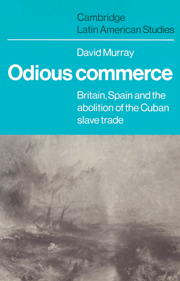Book contents
- Frontmatter
- Contents
- Tables
- Preface
- 1 The ‘opening’ of a legal trade
- 2 Parliament versus Cortes
- 3 Legality and illegality
- 4 The treaty of 1817
- 5 Enforcement and re-enforcement: the attempt to make the slave trade prohibition effective
- 6 The treaty of 1835
- 7 An abolitionist era
- 8 The Turnbull affair
- 9 The Escalera conspiracy
- 10 The penal law of 1845
- 11 Free trade and annexationism
- 12 The failure of the penal law
- 13 A new class of slaves
- 14 The abolition of the Cuban slave trade
- Abbreviations
- Notes
- Bibliography
- Index
- CAMBRIDGE LATIN AMERICAN STUDIES
13 - A new class of slaves
Published online by Cambridge University Press: 16 October 2009
- Frontmatter
- Contents
- Tables
- Preface
- 1 The ‘opening’ of a legal trade
- 2 Parliament versus Cortes
- 3 Legality and illegality
- 4 The treaty of 1817
- 5 Enforcement and re-enforcement: the attempt to make the slave trade prohibition effective
- 6 The treaty of 1835
- 7 An abolitionist era
- 8 The Turnbull affair
- 9 The Escalera conspiracy
- 10 The penal law of 1845
- 11 Free trade and annexationism
- 12 The failure of the penal law
- 13 A new class of slaves
- 14 The abolition of the Cuban slave trade
- Abbreviations
- Notes
- Bibliography
- Index
- CAMBRIDGE LATIN AMERICAN STUDIES
Summary
The two Anglo-Spanish treaties to abolish the Cuban slave trade established a structure of courts and officials in Cuba and on the African west coast to pronounce sentence on every slave ship captured under the treaties' provisions. The treaties also contained clauses guaranteeing the freedom of Africans found on captured slavers. The courts of mixed commission, located in Sierra Leone and Havana, were to free all Africans from condemned slave ships and guarantee their liberty through the issuance of certificates of emancipation. According to the 1817 treaty, all Africans liberated as a result of decisions in the Sierra Leone court would remain in that colony under British supervision and all Africans freed at Havana were to be the responsibility of the Spanish colonial authorities. In Sierra Leone the British colonial officials accepted their role as guardians of the liberty of these freed Africans, although demands for African labourers in the West Indies after 1833 caused considerable exploitation. On the other side of the ocean the fate of the emancipados, as the liberated Africans came to be known, became in Cuba as it did in Brazil a form of slavery in many respects worse than that of legal slavery. Because the emancipado class was brought into existence by treaty, their treatment emerged as one of the thorniest issues at stake between the British and Spanish governments, with angry diplomatic exchanges continuing until long after the Cuban slave trade itself finally had ended.
- Type
- Chapter
- Information
- Odious CommerceBritain, Spain and the Abolition of the Cuban Slave Trade, pp. 271 - 297Publisher: Cambridge University PressPrint publication year: 1981



